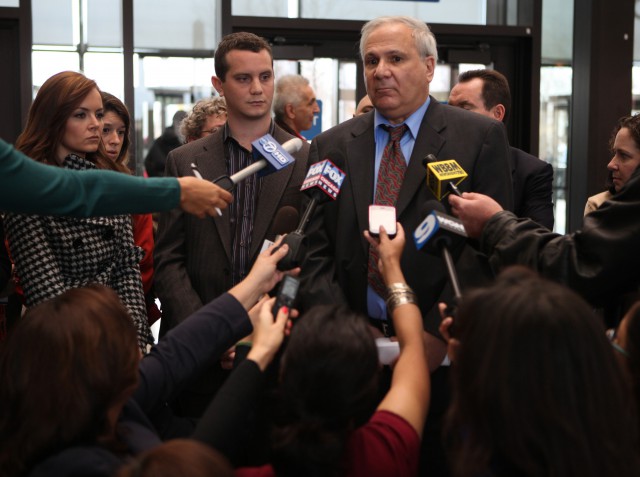
CHICAGO — The Cook County, Ill., state’s attorney’s office on
Tuesday contended student investigators from Northwestern University’s
Innocence Project paid a witness in its investigation to exonerate a man
convicted of murder in 1982.
“This evidence shows that Tony Drakes gave his video
statement upon the understanding that he would receive cash if he gave the
answers that inculpated himself and that Drakes promptly used the money to
purchase crack cocaine,” according to a filing made by prosecutors Tuesday.
The filing argues the students acted as investigators, not reporters, and as
such aren’t protected by press rights.
Prosecutors allege that after conducting a 2004 interview
with Drakes, a private investigator working with students paid a cab driver $60
to take Drakes from the interview site, a park in downstate Swansea, to a gas
station two miles away. That amount was more than the fare and tip, and
leftover cash — $40 — was given to Drakes; he used it to buy crack at a nearby
crackhouse, the filing states.
David Protess, a professor in the university’s Medill School
of Journalism and the director of the Innocence Project, refuted any claim that
a student paid Drakes for the statement, in which Drakes implicates himself in
the killing.
Judge Diane Cannon accepted the prosecutors’ filing and
scheduled the next hearing in the case for Jan. 11.
The Innocence Project in 2003 took on Anthony McKinney’s
case and helped him win a new day in court.
But as they prepare for the hearing on McKinney’s fate,
prosecutors seem to have focused on the students and teacher who led the
investigation. Last month the state’s attorney subpoenaed the students’ grades,
notes and recordings of witness interviews, the class syllabus and even e-mails
they sent to each other and to Protess.
Northwestern has turned over documents related to
on-the-record interviews with witnesses that students conducted, as well as
copies of audio and videotapes.
But the school is fighting the effort to get grades and
grading criteria, evaluations of student performance, expenses incurred during
the inquiry, the syllabus, e-mails, unpublished student memos, and interviews
not conducted on the record, or where witnesses weren’t willing to be recorded.
“I don’t think it’s any of the state’s business to know
the state of mind of my students,” Protess said last month.
“Prosecutors should be more concerned with the wrongful conviction of
Anthony McKinney than with my students’ grades.”
According to Tuesday’s filing, Drakes told the state’s
attorney’s office that the students knew he was looking for money, and he knew
they wanted help with McKinney’s case. McKinney has been in prison for 31
years.
Drakes told prosecutors that he had a 7 p.m. curfew the
night of the interview, and that the Northwestern students initially said they
wouldn’t pay for his statement, but that one student later “flashed a wad
of cash” at him, according to the filing.
After the student paid the cabbie, the driver recorded the
transaction in his log, Tuesday’s filing states. Apparently suspicious that it
was a drug deal or a sting, he wrote: “detective gave me 60, told me to
give him 40, gave me 60 … gave him change.” The “him” refers
to Drakes.
According to the filing, the driver’s log notes the fare for
the two-mile trip to the gas station—normally about $6 — was $20. “The
driver did not claim his $14 tip, he was worried it was drug money,” the
filing states.
{::PAGEBREAK::}
The Innocence Project touts on the Northwestern Web site a
record of helping free 11 wrongly convicted people in the last 10 years.
The cases included the Ford Heights Four, exonerated of the
1978 murders of a suburban couple. Another case centered on Anthony Porter, who
came within 50 hours of execution in 1998 before he won a reprieve. Examination
of the Porter case by an investigative reporting class taught by Protess helped
trigger the Innocence Project’s creation.
About a year ago, the Innocence Project published evidence
that may exonerate McKinney, who was 18 at the time of the murder.
Police at first questioned McKinney after they found him
running near the crime scene. The young man said he was trying to escape gang
members and investigators initially released him.
But a teenage witness came forward, saying he saw McKinney
shoot the guard, Donald Lundahl, in south suburban Harvey.
Students interviewed that witness, who told them police had
beaten the testimony out of him and recanted his previous statements. They also
found the two admitted gang members who say they were, in fact, chasing
McKinney on the night of the killing in retribution for damaging of one of
their cars.
In addition, students conducted a videotaped interview with
a man who claimed to have been present during the murder who said McKinney was
not there.
After amassing that evidence and more, students turned it
over to the Center on Wrongful Convictions in Northwestern’s law school, which
in turn filed a petition on McKinney’s behalf in Cook County Circuit Court.
Cook County State’s Attorney Anita Alvarez has previously
defended subpoenaing those records, arguing that if students wanted “to
put (themselves) into the role of an investigator, then you need to turn over
whatever your notes are.”
Officials with the state’s attorney’s office also said there
could be a bias on the part of students seeking better grades by finding more
witnesses.
Northwestern and its attorneys respond by saying the
investigation should be treated as one conducted by journalists. They said the
county already has all on-the-record information, including interviews and
copies of audio and video tapes.
A series of overturned convictions in Illinois prompted
then-Gov. George Ryan to enact a moratorium on executions in 2000 and grant
clemency to all death row inmates three years later.
Via McClatchy-Tribune News Service.














